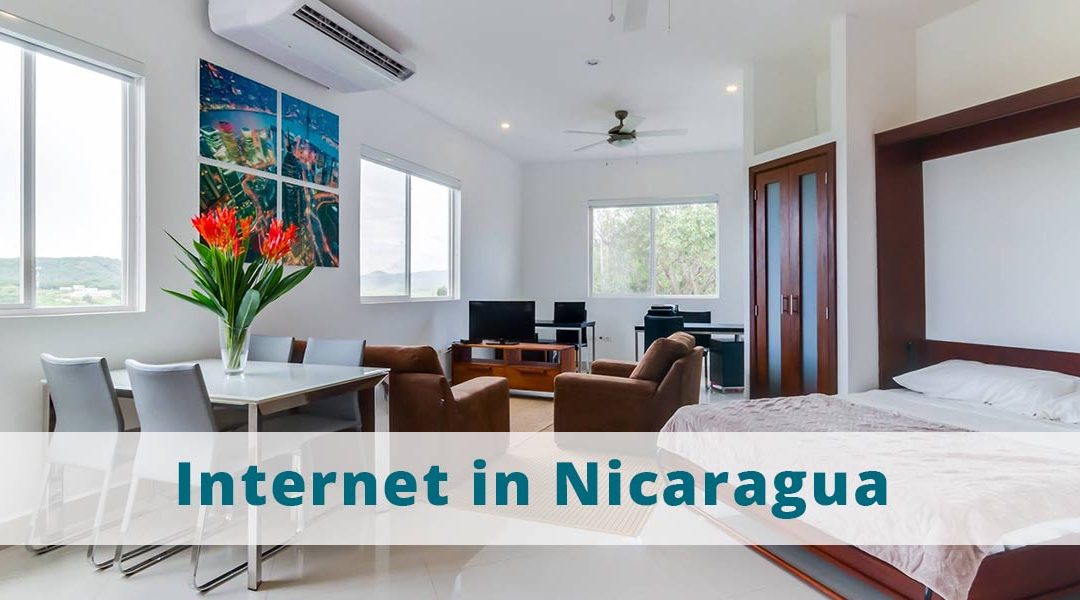The answer is definitely YES! In most regions in Nicaragua that ex-pats choose to call home, the internet speed in Nicaragua is fast and stable enough to work remotely.
There are multiple internet service providers in Nicaragua, and they cover the majority of the country. The availability of internet access along the Atlantic coast may be variable or non-existent. Aside from that, internet connections are fast and reliable. It is reliant on the service you select from the provider. The majority of internet service providers will provide both business and household services. Claro, IBW, Ideay, Amnet, and Movistar are among them.
Here we’ll go over some of the several internet options available in San Juan del Sur. Similarly, go over one of the most critical aspects of working online: remaining connected.
Satellite Internet in Nicaragua
Nicaragua is Central America’s largest and least populated country, with a population of 6.2 million people and is bordered by Honduras, the Caribbean, Costa Rica, and the Pacific Ocean. The Pacific lowlands with extensive fertile valleys, the Amerrisque Mountains, and the Mosquito Coast are the three main sections that makeup Nicaragua’s scenery. Nicaragua is mainly an agricultural country, with tobacco, cassava, bananas, and coffee accounting for 60% of the country’s exports. Mining is currently a growing and vital industry for the Nicaraguan economy since it is becoming less reliant on fossil fuels.
Telecommunications are available in major urban areas throughout Nicaragua, including the capital, Managua. Infrastructure, on the other hand, is limited and in need of expansion outside of urban regions. Nicaragua’s internet network is still in its infancy and requires investment. The World Bank has joined the effort to increase broadband access by supporting broadband infrastructure throughout the country.
The Caribbean Regional Communications Infrastructure Program Project intends to provide regional broadband networks while advancing an information technology and information technology-enabled services (IT and ITES) business in Nicaragua and the Caribbean. It will close key gaps in broadband connectivity on Nicaragua’s Caribbean coast, contributing to improved regional telecommunications links, human capacity development, and business development under a regionally harmonized framework and approach, generating jobs and positioning the region, and Nicaragua in particular, as a preferred destination for IT businesses.
Available Services in Nicaragua
Nicaragua’s telecommunications market has reflected the country’s overall low economic performance, with the lowest fixed-line teledensity and mobile penetration in Central America. Internet cafés provide public access to the internet and email services, typically only found in larger cities. The World Bank has also funded a project to improve connectivity through a national fibre broadband network to address poor infrastructure. On the other hand, internal unrest has stifled any potential growth, and the situation is uncertain.
Market For Telecommunications
In all of Nicaragua’s telecom industries, including fixed-line, mobile, broadband, and pay-TV, América Móvil’s Claro has a commanding advantage. In early 2002, the number of mobile customers surpassed that of fixed lines, and the mobile sector now accounts for the majority of active lines. Movistar, a subsidiary of Telefónica, is Claro’s only fixed-line and mobile competitor. The market duopoly has stifled competition between the two leading firms, resulting in a lack of quality and high costs in the industry.
Nicaragua’s population
In January 2021, Nicaragua’s population was 6.66 million. Between January 2020 and January 2021, Nicaragua’s population grew by 78 thousand (+1.2%). Nicaragua has a female population of 50.7 percent and a male population of 49.3 percent [note: the United Nations does not publish data for genders other than ‘female’ and ‘male’].
Nicaragua’s population is split between urban and rural areas, with urban areas accounting for 59.2 percent of the country’s population and the rural regions accounting for 40.8 percent.
Nicaraguan internet users
In January 2021, Nicaragua had 2.78 million internet users. Between 2020 and 2021, Nicaragua’s number of internet users increased by 362 thousand (+15%). In January 2021, 41.7 percent of Nicaraguans have access to the internet.
Nicaraguan social media statistics
In January 2021, Nicaragua had 3.50 million social media users. Between 2020 and 2021, Nicaragua’s number of social media users increased by 400 thousand (+13%). As a result, in January 2021, Nicaragua’s number of social media users amounted to 52.5 percent of the entire population.
Nicaragua’s mobile connections
In January 2021, Nicaragua had 7.87 million mobile phone connections. Between January 2020 and January 2021, Nicaragua’s number of mobile connections increased by 211 thousand (+2.8 percent). Thus, in January 2021, Nicaragua’s number of mobile connections was equivalent to 118.0 percent of the entire population.
As themajority of people have multiple mobile connections, the percentage of people with mobile connections may approach 100% of the overall population.
Wired internet
Claro
5 Mbps to over 100 Mbps download speeds are available primarily within the city borders. Depending on the street you live on, you may have hardwired DSL, cable, or fibre. A monthly fee of $75 is charged for a 30 Mbps bundle that includes full cable TV and a home phone. There are no bandwidth restrictions.
Internet via point-to-point
WIFINIC, IBW, and so on.
Available wherever a straight line of sight to the communications tower or any of the many repeater stations can be obtained. Download speeds starting from 3 Mbps to 25 Mbps are available. A Wi-Fi router is used to connect a point-to-point service. The monthly cost of a 10 Mbps plan is roughly $115. There are no bandwidth limitations. The cost of installation is approximately $150.
Internet Access via 4G Wireless Wi-Fi
Claro
5 Mbps to 10 Mbps packages are accessible wirelessly through a 4G SIM card router practically everywhere. However, some rural regions may not have a signal 5 Mbps to 10 Mbps packages are available wirelessly through a 4G SIM card router.
The monthly cost of a 10 Mbps bundle with 250 gigabytes of data is roughly $35. In addition, a $65 router is required to connect the service.
Although this subscription does not include unlimited bandwidth, 250 gigabytes of data should be plenty for practically anyone’s professional needs. Streaming UHD to your TV is frequently required to get past this.
Mobile Data
Claro & TIGO
Although some isolated locations may only get Tigo or Claro, not both, the service is generally universal. On tests, rates of up to 40 Mbps were seen depending on the tower’s closeness.
You’ll spend around $12 each month for TigoSemanal plus. You get 14GB of data, unlimited Tigo to Tigo calling minutes, and 120 minutes talking to Claro in Nicaragua or any other number in Central America, Mexico, the United States, or Canada. In addition, there are 120 text messages. Data use for WhatsApp, Instagram, Facebook, and Twitter is not counted.
Reliability is often more crucial than speed. Any provider with 100 percent internet uptime is extremely rare. Therefore, it’s critical to have a backup plan when working online in Nicaragua.
Our Internet Uptime Strategies for 100 Percent Uptime
Internet access at home
We are living on the edges of the city. We are able to convince Claro to install fibre in our neighbourhood for our benefit and that of our neighbours. We get 50 Mbps with no usage cap for $66 each month. We do much of our work online and frequently use Zoom for video calls. Our connection is often superior to that of those we chat with within North America.
Internet backup
Power cuts occur from time to time in San Juan del Sur. It can last as short as 5 or 10 minutes, although it seldom lasts more than a few hours. Therefore, we rely on data from our cell phones to build an internet hotspot during these periods. In this manner, all of our devices will be able to connect to the internet.
Note that It’s critical to keep your phone and PC charged at all times. Otherwise, this backup strategy will be useless. A UPS (Uninterrupted Power Supply) is another excellent solution to extend service with your home ISP or backup ISP.
Improve your vacation experience with Pocket Wi-Fi.
With day passes, Pocket Wi-Fi offers you unlimited internet access during your stay in Nicaragua. A day pass is valid from 00:01 to 23:59 local time in Nicaragua.
In Nicaragua, each day pass includes 512 Mb of high-speed 4G/LTE data, which is then reduced till the next day. Every day of your journey, your day passes will be activated automatically. There’s no reason to be concerned!
When you get to Nicaragua, turn on your pocket Wi-Fi and go wherever you choose, worry-free. If you possessan unlimited internet connection, you will be able to use your favourite Apps, Gps, or any other feature that will help you get the most out of your stay in Nicaragua.
For tourists, the advantages of a Wi-Fi Egg are numerous.
A portable Wi-Fi device can make your life easier if you travel regularly. Are you interested in learning more? The top 5 advantages of using pocket Wi-Fi for travel are discussed in this section.
When compared to a public Wi-Fi access point, the Wi-Fi egg is more secure.
It’s a foregone conclusion in this case. You’ve probably used public Wi-Fi access points at the airport, coffee shops, malls, restaurants, parks, and various other places as a mobile user. Do you believe they are, nevertheless, secure? Unfortunately, even though public Wi-Fi access points are convenient for on-the-go use, they aren’t always safe and can compromise your privacy because they are typically unsecured.
Hack assaults and other cybercrimes such as stealing online information or spying are possible on public Wi-Fi access points. According to research, attacking an open Wi-Fi network takes less than 2 seconds. You can defend yourself from the dangers of public Wi-Fi networks by using a Wi-Fi Egg. If you use a Wi-Fi egg, you won’t have to think twice about entering your bank or credit card information. Portable Wi-Fi devices are all about keeping your device and personal information safe and secure. They’re password-protected and protected by a firewall. You are the master of your Wi-Fi device with a Wi-Fi Egg. Furthermore, many portable Wi-Fi devices include Wireless Protected Access (WPA) and WPA-2 encryption, which improves security while using the internet.
During travel, the Wi-Fi egg is easy to handle and store.
Yes, you read that correctly. A Wi-Fi egg is a small, portable Wi-Fi gadget for on-the-go use. Because it’s so tiny, you can keep it in your pocket at all times.Do you have a tiny sling bag with you? Don’t worry; the Wi-Fi portable device is small enough to be carried in a sling bag.
For business travellers, a Wi-Fi Egg is extremely useful. You can connect to the portable Wi-Fi device immediately, whether you’re on the road or at the airport, and check your emails, make Skype conversations, and do a lot more than you can imagine.
The Wi-Fi egg is a device that can be used for a variety of purposes.
This is an essential feature of a Wi-Fi egg that makes it an excellent travel companion. You may use the portable Wi-Fi device in a variety of ways when travelling. It can be used as a wireless router to share internet access with those in your immediate vicinity. In the presence of a single ethernet connection, you can also use the access point mode to share internet usage.
The Wi-Fi egg paves the way for discovery.
There are times when you want to quickly access the internet and read about a famous restaurant along the way or a monument recommended by one of your travel companions while you’re on the road. You may explore and discover new areas while travelling with the Wi-Fi egg in your pocket or luggage. As a result, a Wi-Fi Egg can be helpful while making last-minute travel preparations. A Wi-Fi Egg can also be used to access GPS to ensure that you’re on the right track.
Wi-Fi egg might help you save a lot of money on data roaming fees.
Who doesn’t hate data roaming fees? Data roaming charges irritate you, us, and everyone else who travels internationally. With a Wi-Fi Egg, you can save up to 95% on data roaming while having unlimited internet access wherever you go.
Why don’t you give a portable Wi-Fi gadget a try now that you’ve learned about its possible benefits? Make sure you have an international Pocket Wi-Fi in Nicaragua if you want to take your vacation to the next level. With unlimited internet in Nicaragua, you can relax and enjoy your journey.
Conclusion
As you’ll see, San Juan del Sur, Nicaragua, has a plethora of internet access alternatives. In addition, we know quite a few folks who work from home. So, you can, too, as long as you have a plan!



